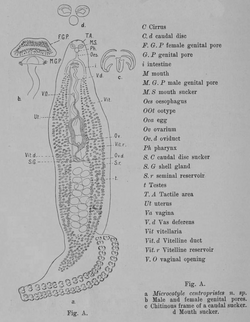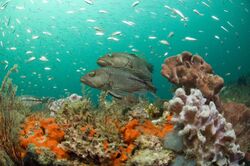Biology:Microcotyle centropristis
| Microcotyle centropristis | |
|---|---|

| |
| Microcotyle centropristis, original description | |
| Scientific classification | |
| Kingdom: | Animalia |
| Phylum: | Platyhelminthes |
| Class: | Monogenea |
| Order: | Mazocraeidea |
| Family: | Microcotylidae |
| Genus: | Microcotyle |
| Species: | M. centropristis
|
| Binomial name | |
| Microcotyle centropristis MacCallum, 1915
| |
| Synonyms | |
Microcotyle centropristis is a species of monogenean, parasitic on the gills of a marine fish. It belongs to the family Microcotylidae.[3]
Taxonomy
Microcotyle centropristis was first described by MacCallum in 1915 based on few specimens from the gills of the black seabass Centropristis striata (Serranidae), from New York City fish market.[3] Unnithan (1971) placed M. centropristis in the nominal subgenus Microcotyle as Microcotyle (Microcotyle) centropristis.[1] In 1972, Caballero y Caballero and Bravo-Hollis erected the genus Paramicrocotyle to describe Paramicrocotyle tampicensis and Paramicrocotyle atriobursata off Mexico, they placed within this genus sixteen species previously assigned to the genus Microcotyle [4] including M. centropristis.[2] However, these two species were returned to the genus Microcotyle by Mamaev.[5]
Morphology
Microcotyle centropristis has the general morphology of all species of Microcotyle, with a symmetrical body, comprising an anterior part which contains most organs and a posterior part called the haptor. The short haptor is symmetrical, and bears clamps, arranged as two rows, one on each side. The clamps of the haptor attach the animal to the gill of the fish. There are also two relatively large and round buccal suckers provided with a row of minute teeth and located at the anterior extremity. The digestive organs include an anterior, terminal mouth, a muscular pharynx, a long oesophagus and a posterior intestine with two lateral branches provided with numerous secondary branches. Each adult contains male and female reproductive organs. The reproductive organs include an anterior genital atrium, armed with numerous fine sharply pointed spines directed inward and upward, a medio-dorsal vagina, a single ovary indistinctly outlined and a number of testes which are posterior to the ovary. The eggs have a very short spur-like processes at each end, instead of filaments, or are rounded at the ends.[3]
Hosts and localities

The host-type is the black seabass Centropristis striata (Serranidae). The type-locality is the New York City fish market.[3]
References
- ↑ 1.0 1.1 Unnithan, R. V. (1971). On the functional morphology of a new fauna of Monogenoidea on fishes from Trivandrum and environs. Part IV. Microcotylidae sensu stricto and its repartition into subsidiary taxa. American Midland Naturalist, 366-398.
- ↑ 2.0 2.1 Caballero y Caballero, E., & Bravo-Hollis, M. (1972). Monogenea (van Beneden, 1858) Carus, 1863 de peces marinos del litoral Mexicano del Golfo de Mexico y del Mar Caribe.V. Revista de Biología Tropical, 20, 151-165. PDF

- ↑ 3.0 3.1 3.2 3.3 MacCallum, 1915. Notes on the genus Microcotyle III. Zoologische Jahrbücher. Abteilung für Systematik, Geographie und Biologie der Tiere. 38, 71-78 [1]

- ↑ Mendoza-Franco, Edgar F.; Rosado Tun, Mariela del Carmen; Duarte Anchevida, Allan de Jesús; del Rio Rodríguez, Rodolfo E. (2018). "Morphological and molecular (28S rRNA) data of monogeneans (Platyhelminthes) infecting the gill lamellae of marine fishes in the Campeche Bank, southwest Gulf of Mexico". ZooKeys (783): 125–161. doi:10.3897/zookeys.783.26218. ISSN 1313-2970. PMID 30275730.

- ↑ Mamaev, Y. L. (1986). The taxonomical composition of the family Microcotylidae Taschenberg, 1879 (Monogenea). Folia Parasitologica, 33, 199-206. PDF

Wikidata ☰ Q2322970 entry
 |
